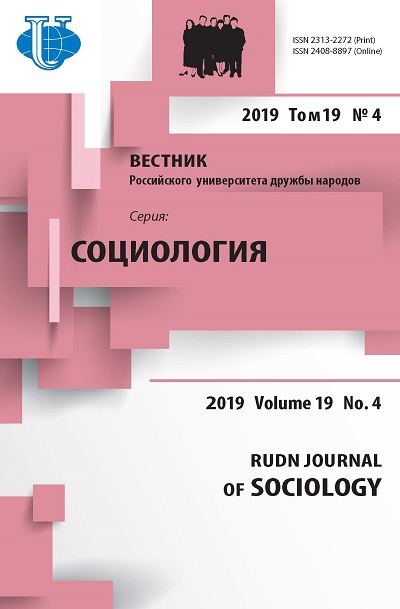Family entrepreneurship in the countryside: Some details of the portrait
- Authors: Bozhkov OB1
-
Affiliations:
- Sociological Institute branch - of the Federal Center of Theoretical and Applied Sociology of the Russian Academy of Sciences
- Issue: Vol 19, No 4 (2019)
- Pages: 787-799
- Section: Surveys, experiments, case studies
- URL: https://journals.rudn.ru/sociology/article/view/22098
- DOI: https://doi.org/10.22363/2313-2272-2019-19-4-787-799
- ID: 22098
Cite item
Full Text
Abstract
The article is an interim result of many years of studies focused on the wide range of issues related to the development of farmers’ movement, to the interaction of contemporary rural entrepreneurs with government, rural population and colleagues in production activities. This project (field expeditions of 2018-2019) aims at assessing the challenges and prospects of the two key social institutions of the Russian village - local authorities and entrepreneurs - in terms of the dominant scenarios of their interaction and their role in stabilizing the situation in rural areas. This two-year field studies repeat the expeditions of a decade ago combining quantitative and qualitative approaches in the study of specific cases - settlements that represent the features of the Non-Black Earth regions of Russia. The author focuses on the issue actually ignored by researchers of agricultural problems - family entrepreneurship in the countryside. In the introduction, the author provides a brief overview of the specifics of the rural lifestyle in pre-revolutionary Russia. The first part of the article considers social-economic processes in the countryside during the Soviet period, which laid the foundation for the problems that determined the paths of the post-Soviet rural development. The second part of the article presents the features of the post-Soviet period in the life of the village, mainly based on the data of field expeditions to the Russian Non-Black Earth regions in 2004-2008. And, finally, the third part of the article summarizes the author’s first impressions and some results of the 2019 field expeditions and identifies permanent challenges for rural entrepreneurs. For instance, in almost every rural area of the Russian Non-Black Earth regions, one can meet farmers who strive to create a family business but are forced to take numerous tricks to achieve their goal, as if proving M. Certeau theory of resistance of the “weak” to the “strong”.
About the authors
O B Bozhkov
Sociological Institute branch - of the Federal Center of Theoretical and Applied Sociology of the Russian Academy of Sciences
Author for correspondence.
Email: olegbozh@gmail.com
старший научный сотрудник
7th Krasnoarmeiskaya St., 25/14, Saint Petersburg, 190005, RussiaReferences
- Aleshkin P., Vasiliev Yu. Krestyanskie vosstaniya v Rossii v 1918—1922 gg. Ot makhnovshchiny do antonovshchiny [Peasant Uprisings in Russia in 1918—1922 From Makhnovshchina to Antonovschina]. Moscow; 2013 (In Russ.).
- Bezgin V.B., Erin P.V. Krestyanskaya semya i selskaya obshchina kontsa XIX — nachala XX veka (na materialakh Tambovskoy gubernii) [Peasant family and rural community of the late 19 — early 20 centuries (based on data from the Tambov Province)]. Vestnik TGTU. 2012; 18 (2) (In Russ.).
- Bozhkov O.B., Trotsuk I.V. Tendentsii razvitiya selskikh rayonov Rossii: postanovka issledovatelskoy zadachi i pervye rezultaty povtornogo keys-stadi [Tendencies of the Russian rural areas development: The research task and first results of the comparative case-study]. RUDN Journal of Sociology. 2018; 18 (4) (In Russ.).
- V kakom godu kolkhozniki SSSR smogli poluchit pasporta? [In what year did the collective farmers of the USSR get passports?]. http://demoscope.ru/weekly/2002/093/arxiv01.php (In Russ.).
- Vishnevsky A.G. Evolyutsiya rossiyskoy semyi [Evolution of the Russian family]. Ekologiya i Zhizn. 2008; 7 (In Russ.).
- Konovko A. Krestyane i bolsheviki [Peasants and Bolsheviks]. http://expert.ru/expert/ 2012/15/gibel-uklada (In Russ.).
- Lozh o pasportnoy sisteme SSSR i “krepostnykh” kolkhoznikakh [Lies about the passport system of the USSR and the “serf” collective farmers]. https://www.liveinternet.ru/users/ 3790905/post393798679 (In Russ.).
- Mnogoukladnost Rossii: istoricheskie korni, sostoyanie i perspektivy [Multi-forms of the Russian Ways of Life: Historical Roots, State, and Prospects]. Otv. red. T.E. Kuznetsova. Moscow; 2009 (In Russ.).
- Nefedova T.G. Desyat aktualnyh voprosov o selskoy Rossii: Otvety geografa [Ten Actual Questions about Rural Russia: Answers of a Geographer]. Moscow; 2013 (In Russ.).
- Nikulin A.M., Trotsuk I.V. Selskoe razvitie Finlyandii: vzaimodeystvie gosudarstva, fermerov i nauki (vozmozhnye uroki dlya Rossii) [Rural development of Finland: The interaction between state, farmers and scientific knowledge (possible lessons for Russia). Mir Rossii. 2014; 3 (In Russ.).
- Certeau M. Izobretenie povsednevnosti. 1. Iskusstvo delat. [The Practice of Everyday Life. 1. The Art of Doing]. Per. s fr. D. Kalugina, N. Movninoy. Saint Petersburg; 2013 (In Russ.).
- Trotsuk I.V. Vozmozhnosti metoda keys-stadi v izuchenii sotsialnyh problem sela [Case-study’s potential in the study of social problems of the village]. RUDN Journal of Sociology. 2007; 4 (In Russ.).
- Trotsuk I.V. Putevoditel po postsovetskoy agrarnoy reforme v Rossii: obiektivnoe i subiektivnoe izmerenie selskoy zhizni [A guide to the post-soviet agrarian reform in Russia: Objective and subjective dimensions of rural life]. Russian Peasant Studies. 2017; 2 (3) (In Russ.).
- Ellickson R. Poryadok bez prava: kak sosedi ulazhivayut spory [Order without Law: How Neighbors Settle Disputes]. Per. s angl. M. Markov, A. Lashchev; nauch. red. D. Kadochnikov. Moscow; 2017 (In Russ.).
- Scott J.C. Weapons of the Weak: Everyday Forms of Peasant Resistance. Yale University Press; 1985.
- The Postsocialist Agrarian Question. Property Relations and the Rural Condition. C. Hann, R. Rottenburg, B. Schnepel, S. Shimada (Eds.). Vol. 1. Lit Verlag; 2003.
- Wegren S., Nikulin A., Trotsuk I. Russian agriculture during Putin’s fourth term: a SWOT analysis. Post-Communist Economies. 2019; 31 (4).
Supplementary files













